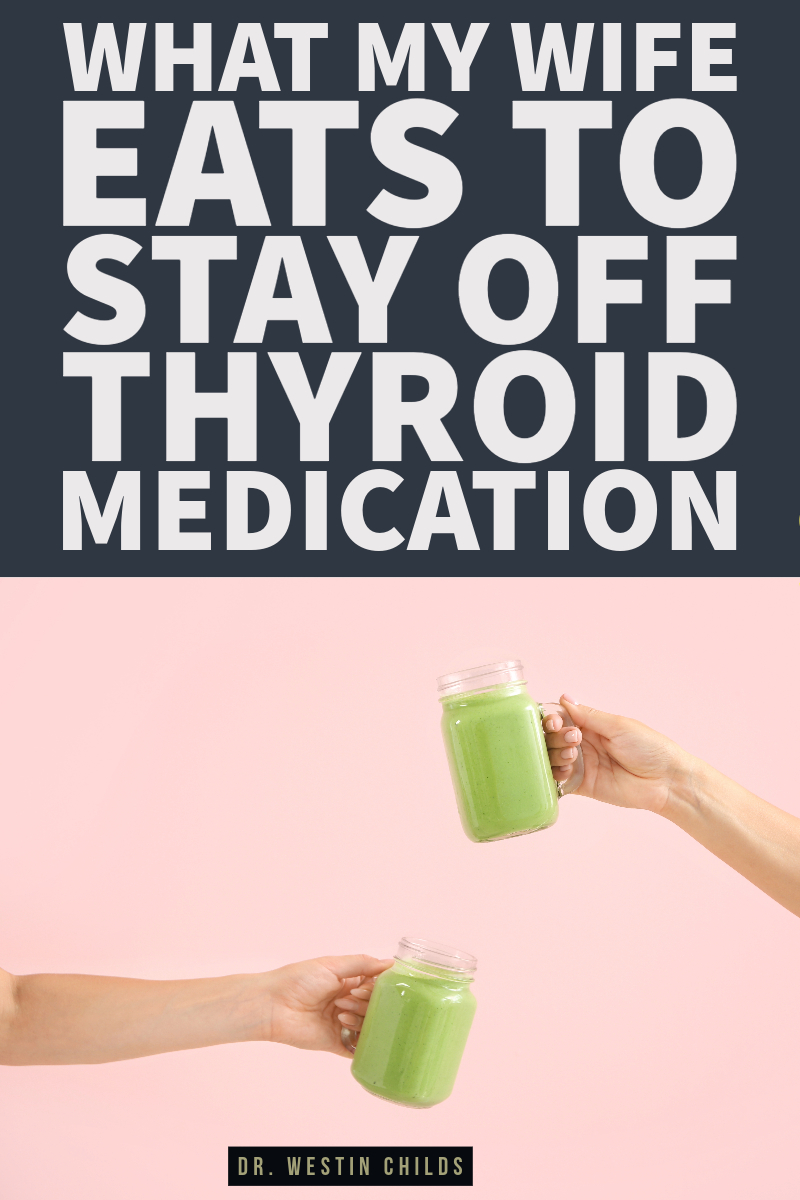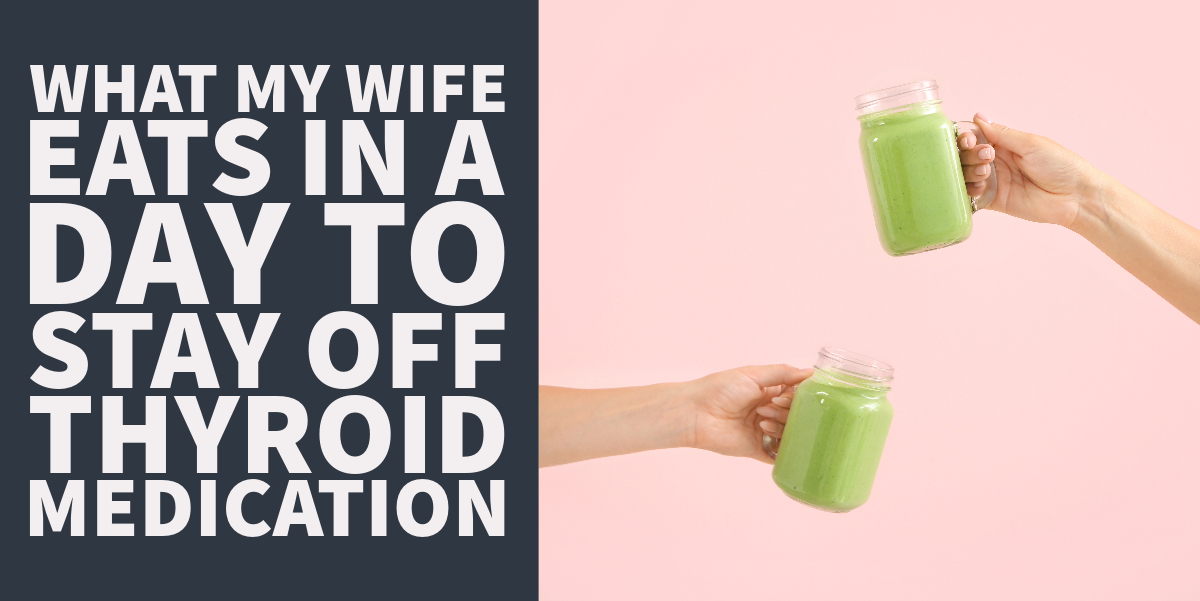If you can eat your way into a thyroid problem, can you eat your way out?
Well, I won’t say it’s always possible, but there are definitely situations where it can happen.
My wife is a perfect example of this.
She was able to adjust her diet to the point that she was able to come off of her thyroid medication for good.
And today I’m going to share exactly what she eats (on an average day) to give you an idea of how she did it.
Let’s jump in:
DOWNLOAD FREE RESOURCES
Foods to Avoid if you Have Thyroid Problems:
I’ve found that these 10 foods cause the most problems for thyroid patients. Learn which foods you should avoid if you have thyroid disease of any type.
The Complete List of Thyroid Lab tests:
The list includes optimal ranges, normal ranges, and the complete list of tests you need to diagnose and manage thyroid disease correctly!
A Brief Thyroid History
Since not everyone is familiar with her situation, let me briefly give you some backstory.
The type of thyroid condition that she suffered from was not typical.
Her thyroid dysfunction stemmed from a history of an eating disorder that she went through during her teenage years.
As a result, she suffered from metabolic damage, low T3, thyroid resistance, persistent depression, and difficulty losing weight.
Her standard labs look fairly normal with the exception of a slightly elevated TSH and a low T3 but other than that, she was told her hormones were “normal”.
It wasn’t until I really started to specialize in treating the thyroid that I realized what was going on and put her on pure T3 in the form of liothyronine to correct these issues.
And it worked out great.
This treatment dramatically improved her mood, allowed her to lose weight, and slowly healed her metabolism.
Her dose ranged from 25 to 50 mcg each day which she would control and adjust as needed.
She was on this therapy for about 4 years but never really liked the idea of being reliant upon thyroid medication forever (like many of you) so she took it upon herself to try and wean off her meds and enlisted my help in the process.
I knew it would be difficult because thyroid medication, T3 especially, provides a huge boost to metabolism.
And when you start weaning off, there’s a fairly high chance that you might experience weight gain in the process.
This was a big deal for my wife (as it is for many women), so I knew that she would have to be very strict with her diet in the process.
Fast forward several months and she was completely off her thyroid medication with a stable weight, no additional weight gain, and control over her other symptoms like depression.
The only minor residual symptom that she still deals with is some slight swelling in the legs but she would much rather deal with that than continue taking thyroid medication.
Through a lot of trial and error, she figured out exactly the type of diet that her body needed to get there which is what I want to share with you right now.
But first… a few disclaimers:
A Couple of Disclaimers
- The type of diet that she used to get off her medication is not the standard diet that I recommend for most thyroid patients. But even though that’s the case, it’s great for other people to see that all types of diets and foods can help, it’s more about finding what works for your body and sticking with it.
- This diet is what worked for her and it may not work well for you. I am not suggesting that this is the “best” diet for everyone to get off their medication, I’m just sharing what worked for one person.
- This represents her ideal diet and there’s definitely some variation from this day to day and month to month depending on her cycle, mood, and other factors. She wanted me to make sure everyone knows she’s not 100% perfect in eating this way but this is the standard that she always goes back to.
In addition to these disclaimers, here are some guidelines that she follows when looking for new meals and figuring out what to eat:
- She focuses on eating a primarily plant-based vegan diet 80% of the time with meats filled in for protein as needed. She will base her need for protein intake on her body and her cycle. Her favorite protein source includes chicken, beef, eggs, ground turkey, and protein powder.
- One of her primary metrics to determine what she should eat is her digestion and whether or not she feels bloated. She will avoid any foods that interfere with her digestion or those that cause bloating (which is why dairy is removed).
- She knows if she starts to become too loose with her diet because she will feel her depression creep back. This is a sign she needs to get back on track.
- Aside from homemade Kamut-based bread, she is gluten-free.
- She minimizes her intake of fat preferring to cook without oil and her primary fat sources are avocados (whole-food), extra virgin olive oil, chia seeds, hemp hearts, and occasional nuts/nut butter.
- She doesn’t track calories or macros.
- She avoids artificial sweeteners and she’s not afraid to use honey, maple syrup, or dates for sweetening. For natural sweeteners, her preference is stevia and erythritol.
With this out of the way, here’s a standard day for her:
Breakfast
Pretty much no matter what, she starts every day with a green smoothie.
She does this because when her first meal of the day is super healthy, it’s easy to continue to eat healthy for the rest of the day.
There are a bunch of different variations to the smoothies that she makes, but here is one of her favorites:
Super Green Smoothie
- 6 stalks of celery
- 5 leaves of kale
- Juice of 2 lemons
- 1 cup of water
- 2 or 3 frozen bananas
The goal with this meal is to get as many greens in as possible but she’s not afraid to sweeten the meal with frozen fruit.
She’s found that her body responds VERY well to celery and kale, which is why pretty much every variation of smoothie will include these two greens.
Lemon juice is included for its benefit on digestion (1), bananas provide sweetness, and water is used instead of juice to limit unneeded calories.
Occasionally, she will use coconut water as the base for these smoothies as well.

*Note: I try to get her to add protein powder to her morning smoothies but she prefers the taste without.
If you are thinking about adding smoothies to your morning routine (which I would highly recommend), definitely consider adding protein powder!
I find that many thyroid patients are NOT getting enough protein in each day and this is a problem that can be easily fixed.
More protein means more muscle mass which means better thyroid function and better weight control (2)!
Lunch
Much like breakfast, her lunch is another vegan whole-food-based meal.
Her morning smoothie is more about getting in as many greens as possible and her lunch is about getting as many fruits in as possible to satisfy her sweet tooth.
This meal varies from day to day but her go-to meals are overnight oats or chia bowls.
Both chia bowls and overnight oats are vegan, loaded with whole foods, designed to have tons of fiber for digestion and taste great pretty much no matter what you throw in them.
Her is one of her favorite overnight oat recipes:
- ½ cup oats
- 2 tbsp fresh ground flax (grind morning of with Vitamix)
- 1 cup water
- 1 apple grated
- 1 cup blueberries
- 1 cup grapes or other berry
- 4 dates chopped
- 2 Tbsp raisins
Here is one of her favorite chia bowl recipes:
- Papaya
- Raspberries
- Chia seeds
- Cashews
- Bananas
- Dates
Chia seeds and flax seeds provide plant-based protein as well as healthy fats (3), fruits provide loads of fiber and polyphenols (4), oats give long-lasting energy as a slowly digested carbohydrate, and papayas are great for gut health and skin health.
Dinner
While both breakfast and dinner are primarily whole-food vegan-based meals, dinner is the meal that she uses to load up with protein.
This meal almost always includes some form of animal protein and has a starch base (usually sweet potato).
She likes to have her biggest and most filling meal at the end of the day because she always ends up with food cravings in the evening.
Again, there are a lot of variations here, but here is one of her favorites that she will have several times per week:
Ground Turkey Sweet Potato Hash
- Sweet potato
- Corn
- Black beans
- Avocado
- Ground turkey
She created her own recipe for this meal but it was inspired based on this.
Snacks
She loves snacks and has several that are her go-to’s when she’s feeling like she wants to snack or eat something sweet.
Here are her favorites:
- A handful of dates either plain or with nut butter (usually no more than 4-5)
- Fresh fruit (any kind)
- Hard-boiled eggs (1-3 depending on her appetite)
- Water with or without electrolytes (she loves to flavor her water with Ultima)
- Thyro fuel with water
- Kamut toast with eggs
- Seed bread
- Raw vegan treats
- Popcorn with olive oil or coconut oil (no seed oils!)
Many of the vegan recipes she uses for snacks, smoothies, and meals were adapted from the recipes found in these ebooks.
Some Additional Things to Consider
There are a few things that I want to leave you with as you think about your diet and your thyroid.
Depending on where you are at on your journey, you may look at this information and get overwhelmed.
Don’t.
Figuring out what type of foods work best for your body is probably not as difficult as you might think.
Will it take a lot of work and time? Yes, but as long as you pay attention to how you are feeling, you will get there.
You also have to remember that despite what the world would have you think, there’s no such thing as a perfect diet for everyone with a thyroid problem.
As far as my wife’s diet goes, I actually think she could make a few tweaks to make it even better, but here’s the thing:
It works for her!
So I can’t really complain too much about it.
My biggest gripe is that she doesn’t get enough protein in, but she is able to stay lean and she is happy with her body composition and physique.
The other thing you may notice is that she eats a lot of carbohydrates and sugars.
I do believe that many people, especially thyroid patients, are undereating on this important macromolecule.
With the popularity of keto and carnivore, carbohydrates, including fruits, have been demonized.
But there’s no question that healthy carbohydrates from fruits, vegetables, and other whole foods, are definitely needed for hormone balance and optimal thyroid hormone function (5).
I would also go as far as to say that they are beneficial for women who are trying to repair a damaged metabolism from yo-yo dieting or eating disorders (such as my wife).
Recap & Final Thoughts
No matter what type of diet you adopt, make sure to remember this:
Having a thyroid problem will impact your ability to both gain weight and lose weight.
It will be more difficult for you to lose weight and easier for you to gain weight, even if your thyroid function is optimized well.
This doesn’t have to be a problem, though, because you can compensate with your diet.
You may not be able to indulge as often as those without a thyroid problem, but you can still have the occasional indulgence.
My final tip is to spend time (a lot of time), learning how to cook.
Feel free to spend time and money on food and cookware but stay away from food services that try to take cooking out of the equation.
Learning how to cook will mean that you can make healthy dishes that not only taste amazing but will keep you coming back to them for a long time.
Now I want to hear from you:
Did you know that your diet plays a big role in your thyroid health?
Were you aware that it was possible to get off of thyroid medication? Or is this the first time you’ve heard about it?
Are you planning on making any changes to your diet or lifestyle after reading this?
If so, what changes?
Leave your questions or comments below!
Scientific References
#1. pubmed.ncbi.nlm.nih.gov/35013789/
#2. ncbi.nlm.nih.gov/pmc/articles/PMC4037849/
#3. ncbi.nlm.nih.gov/pmc/articles/PMC6627181/
#4. ncbi.nlm.nih.gov/pmc/articles/PMC2835915/
#5. pubmed.ncbi.nlm.nih.gov/3900181/









